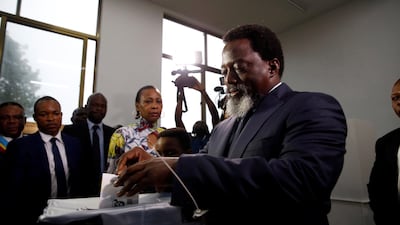Presidential elections that will shape the future of one of Africa's biggest and most unstable countries got underway in the Democratic Republic of Congo on Sunday after a two-year delay.
But observers reported worrying problems, from long queues to hitches with electronic voting machines whose introduction caused a storm.
The vote gives the DRC the chance of its first peaceful transfer of power since it gained independence from Belgium in 1960.
Analysts, though, say the threat of upheaval is great, given organisational problems and suspicion of President Joseph Kabila, who refused to quit in 2016 after his two-term limit expired.
The election's credibility has been strained by repeated delays, fears of problems on polling day and accusations that voting machines would help to rig the result.
On election eve, talks aimed at averting violence after the vote broke down.
Opposition frontrunners Martin Fayulu and Felix Tshisekedi refused to sign a proposed code of conduct with Mr Kabila's preferred successor, Emmanuel Ramazani Shadary. They accused officials with the Independent National Election Commission (Ceni) of thwarting changes to the text.
The UN, US and Europe have appealed for the elections to be free, fair and peaceful – a call echoed by the presidents of Angola, Botswana, Namibia, Zambia and the neighbouring Republic of Congo.
And in the Vatican, Pope Francis led thousands of worshippers in St. Peter's Square on Sunday in prayers for "normal and peaceful" elections.
_______________
Read more:
In Democratic Republic of Congo, activists face uphill struggle
Nobel Peace Prize 2018 winners call for an end to rape in conflict
Who is the 2018 Nobel Peace Prize winner Denis Mukwege?
________________
Many voters said they were exhilarated to be taking part in the first elections after the nearly 18-year Kabila era.
"I feel liberated, freed," said Victor Balibwa, a 53-year-old civil servant, casting his ballot in Lubumbashi, the country's mining capital in the southeast.
"I'm excited to vote, to be able to choose at last. It's my first election," an 18-year-old student named Rachel said in the eastern city of Goma, an opposition stronghold.
But there was also much evidence of problems.
An on-the-ground team of 41,000 election monitors set up by the powerful Catholic church said that 830 polling stations failed to open on schedule.
In some places, voting was held up by long queues because of a lack of electoral roll, voters who could not find their names on the list, or technical problems with the voting machines.
Twenty-one candidates are running in the presidential election, taking place alongside legislative and municipal ballots.
The frontrunners include Kabila's champion Shadary, a hardline former interior minister facing EU sanctions for a crackdown on protesters.
His biggest rivals are Fayulu, until recently a little-known legislator and former oil executive, and Tshisekedi, head of a veteran opposition party, the UDPS.
Almost the size of continental western Europe, the DRC is rich in gold, uranium, copper, cobalt and other minerals, but little wealth trickles down to the poor.
In the last 22 years, it has twice been a battleground for wars drawing in armies from central and southern Africa.
That legacy endures in the jungles of eastern DRC, where militias have carried out hundreds of killings.
Insecurity and an ongoing Ebola epidemic in part of North Kivu province, and communal violence in Yumbi, in the southwest, prompted the authorities to postpone the elections there until March.
Despite this, the elections in the rest of the country have gone ahead, and the new president will be sworn in on January 18.
Around 1.25 million people in a national electoral roll of around 40 million voters are affected.

